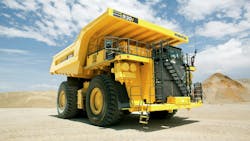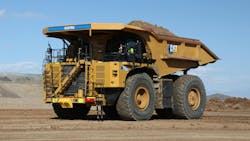Mines to Test Cat, Komatsu Battery Electric Haul Trucks
Rio Tinto and BHP will test two Caterpillar 793, and two Komatsu 930 battery electric haul trucks in Western Australia’s Pilbara region, "to accelerate the potential for its future deployment" the companies say.
The companies will work with both manufacturers to conduct independent trials of their battery-electric haul trucks, including testing of battery, static and dynamic charging systems, to assess performance and productivity in the Pilbara environment.
In 2021, Rio Tinto and BHP worked with Caterpillar and Komatsu to support the development and validation of their prototype battery-electric haul trucks. The trucks included in these trials are based on the prototypes.
As part of the collaboration the Cat haul trucks will be trialled from the second half of 2024, and the Komatsu haul trucks tested from 2026 at mines in Pilbara.
Caterpillar and Komatsu will each provide one truck each to both BHP and Rio Tinto for the trials. BHP will trial the Cat trucks, while Rio Tinto will trial the Komatsu trucks. Outcomes of the trials will be shared between BHP and Rio Tinto.
Ongoing testing, development and refinement of truck and battery design is anticipated with each manufacturer. This will inform the approach for testing a larger number of haul trucks and the potential deployment of battery-electric haul truck fleets into each company’s operations.
Simon Trott, Rio Tinto Iron CEO, said in a statement:
“There is no clear path to net zero without zero-emissions haulage, so it’s important that we work together to get there as quickly and efficiently as we can. Testing two types of battery-electric haul trucks in Pilbara conditions will provide better data, and by combining our efforts with BHP we will accelerate learning."
“Replacing diesel as a fuel source requires us to develop a whole new operational ecosystem to surround the fleet," said Geraldine Slattery, president BHP, in a statement. "We need to address the way we plan our mines, operate our haulage networks, and consider the additional safety and operational considerations that these changes will bring. This is why trials are so critical to our success as we seek to test and learn how these new technologies will work in practice and integrate into our mines."
About the Author
Harlee Hewitt
Harlee is a former associate editor for Construction Equipment.

